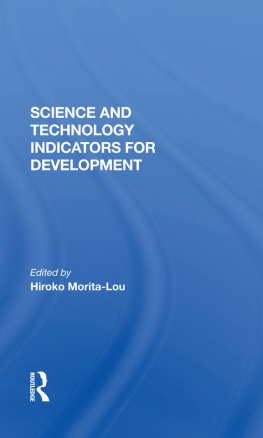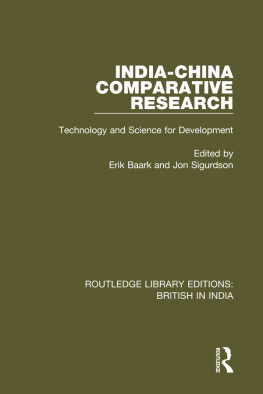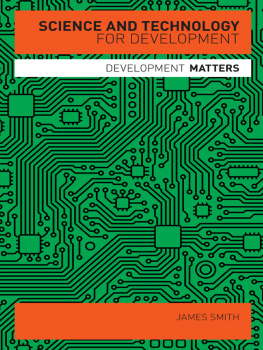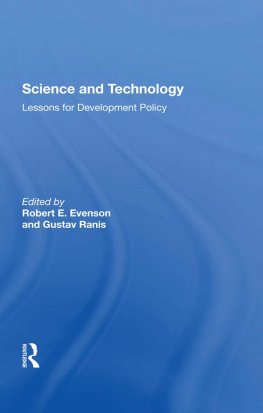First published 1988 by Westview Press, Inc.
Published 2019 by Routledge
52 Vanderbilt Avenue, New York, NY 10017
2 Park Square, Milton Park, Abingdon, Oxon OX14 4RN
Routledge is an imprint of the Taylor & Francis Group, an informa business
Copyright 1988 Taylor & Francis
All rights reserved. No part of this book may be reprinted or reproduced or utilised in any form or by any electronic, mechanical, or other means, now known or hereafter invented, including photocopying and recording, or in any information storage or retrieval system, without permission in writing from the publishers.
Notice:
Product or corporate names may be trademarks or registered trademarks, and are used only for identification and explanation without intent to infringe.
Library of Congress Cataloging-in-Publication Data
Wad, Atul.
Science, technology, and development/by Atul Wad.
p. cm.--(Westview special studies in social, political, and economic development)
ISBN (U.S.) 0-8133-7410-3
1. Technological innovations--Economic aspects--Developing countries. 2. Science--Social aspects--Developing countries. 3. Appropriate technology--Developing countries. 4. Economic development. I. Title. II. Series: Westview special studies in social, political, and economic development.
HC59.72.T4W33 1988
338'.06--dc19
87-34543
CIP
ISBN 13: 978-0-367-28674-3 (hbk)
I would like to express my gratitude to the Third World Foundation, London, for the support provided for the preparation of this book. I would also like to thank all of the authors, not only for their willingness to contribute to this book, but also for their patience during the long process of editing and publication. I am particularly grateful to Dieter Ernst, who helped tremendously in the original planning for the book, and to the Center for the Interdisciplinary Study of Science and Technology at Northwestern University for providing a supportive environment during the later stages of editing. Finally, I would like to thank my wife, Jasmine, for her help in typing and correcting the manuscript and for all her support and patience throughout.
Atul Wad
CISST, Northwestern University
It may not be very widely known that the United Nations is presently engaged in an extensive global review of the progress achieved in the development of scientific and technological capabilities in the third world. The review is being undertaken to assess the progress made during the decade since the United Nations Conference on Science and Technology for Development, held in Vienna in 1979. The main output of the conference, the Vienna Plan of Action, served as a major framework for promoting endogenous scientific and technological capabilities in the third world. For many, the Vienna conference still represents a major landmark in terms of the manner in which the relationship between science, technology and development was conceptualized, with its emphasis on "horizontal," cross-sectorial approaches, its concern with "endogenous" self-sustaining capabilities and the importance given to international cooperation to achieve these ends.
Much has been achieved during this decade, as the end of decade review of the implementation of the Vienna Program of Action is likely to show. But it will also probably show a large variance between regions and countries in the extent to which their technological and scientific capabilities have improved and identify a series of new problems and obstacles that have emerged to the development of such capabilities.
The end-decade review may be a useful exercise. It could focus world-wide attention on the subject, as did the Vienna conference, and hopefully will mobilize a new wave of initiatives both in terms of research and practice for the coming decade. At this juncture in history, such a fresh infusion of energy, should it be accompanied with the requisite competence and resources, would be a fortunate and positive occurrence.
There has also been talk of another "megaconference" on science and technology towards the end of the century, and the review could provide valuable inputs for this event. Also, it will provide valuable feedback to the governmental, inter-governmental, non-governmental, regional and international bodies that have been involved in one way or the other with the implementation of the Vienna Program and presumably help them to improve their own efforts.
It is important to recognize, however, that the Vienna Program is a specific articulation of a much larger and complex subject of both intellectual inquiry and practical action. The relationship between scientific and technological change and socio-economic development has been a subject of study and concern for several decades, if not longer. It is a complex subject, with various disciplinary ideological and philosophical perspectives represented and often in conflict with each other, many different interpretations about the domain of the field, and even more differences of opinion as to what works and does not work, and for what end goal, in the real world.
This collection of papers is coincidentally coming out at the same time that the U.N. end-decade review is under way. It does not have any connection with that review except to the extent that it deals with the same subject. Hopefully, what the set of papers does is present a sensible overview of the types of issues and problems that are currently of concern within the field, reflect the diversity of the field itself, and offer some suggestions as to new directions and questions for the field to address. The papers have been contributed by authors from various parts of the world who are immersed in the study of this subject and whose concern for promoting the contribution of science and technology to socio-economic development is reflected in the character of their papers and the form of their inquiry.
Three factors that have influenced the manner in which science and technology are dealt with in the context of development in recent times are worth mentioning here.
First, the advent of the new wave of technologies microelectronics, biotechnology etc. - has evoked a strong interest in and concern over the potential impacts of these technologies for the third world. These have ranged from extremely pessimistic views that these technologies will only make the third world more backward and dependent to more optimistic hopes that these technologies offer developing countries an historically unique opportunity to close the gap with the industrialized world and achieve rapid economic growth. It is still unclear as to which of these scenarios is more accurate. What does seem to be clear is that the problem presented by advanced technologies is far more complex than it was previously thought to be. These technologies are having far-reaching effects in all countries, advanced as well as developed. Furthermore, they are inextricably linked up with changing structures in international production, changing value systems, and a changing international political economy. Technological change and advance is occurring on an increasingly wider scale; the world is becoming technologically multipolar. A simple preoccupation with the "pluses" and "minuses" of new technologies is inadequate in the face of this complexity, as is improper an "entrancement" with them on the part of those concerned with their implications. Needed are objective and dispassionate analyses that can improve our understanding of how these technologies have affected the interactions between scientific and technological processes, on the one hand, and social, economic, political, institutional, cultural and historical processes on the other.














